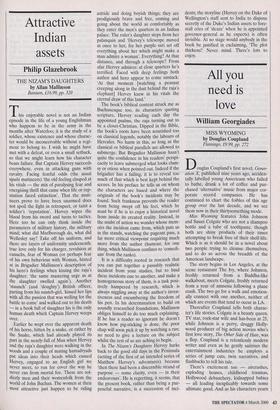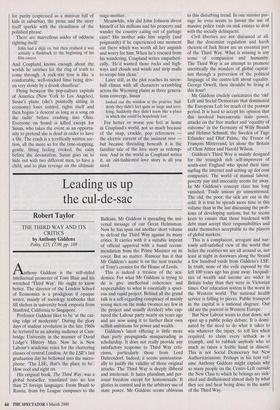All you
need is love
William Georgiades
MISS WYOMING by Douglas Coupland Flamingo, £9.99, pp. 272 ouglas Coupland's first novel, Gener- ation X, published nine years ago, acciden- tally labelled young Americans who failed to bathe, drank a lot of coffee and pur- chased `alternative' music from major cor- porate record companies. He has continued to chart the foibles of this age group over the last decade, and we see them now in their thirtysomething mode.
Miss Wyoming features John Johnson and Susan Colgate who are not a shampoo bottle and a tube of toothpaste, though both are shiny products of their times attempting to break free of their shelf-life. Which is as it should be in a novel about two people trying to cleanse themselves, and to do so across the breadth of the American landscape.
The story begins in Los Angeles, at the scene restaurant The Ivy, where Johnson, freshly returned from a Buddha-like walkabout, meets Colgate, freshly returned from a year of amnesia following a plane crash. The two go for a walk and emotion- ally connect with one another, neither of which are events that tend to occur in LA.
Thereafter Coupland tells both charac- ter's life stories. Colgate is a beauty queen, TV star, rock-star wife and has-been at 25, while Johnson is a pervy, druggy Holly- wood producer of big action movies who's first love story, The Other Side of Hate, was a flop. Coupland is a relentlessly modern writer and even as he gently satirises the entertainment industries he employs a series of jump cuts, twin narratives, and flashbacks to tell his tale.
There's excitement too — aircrashes, exploding houses, childhood traumas, Hollywood debauchery, kidnapped babies — all leading inexplicably towards some ultimate good. And as his characters yearn for purity (expressed as a minivan full of kids in suburbia), the prose and the story itself sparkle with the cleanliness of the polished phrase.
There are marvellous asides of oddness righting itself:
John had a déjà vu, but then realised it was actually a flashback to the beginning of his film career.
And Coupland knows enough about the worlds he satirises for the ring of truth to come through. A rock-star tour is like 'a comfortable, well-stocked limo being driv- en very slowly by a drunk chauffeur'.
Flying between the pop-culture capitals of America (New York to Los Angeles), Susan's plane (she's pointedly sitting in economy) loses control, rights itself and then begins 'a descent as long as a song on the radio' before crashing into Ohio. Everyone on board is killed except for Susan, who takes the event as an opportu- nity to pretend she is dead in order to have a life. The crash is a terrifically written sec- tion, all the more so for the time-stopping, gentle, lilting feeling evoked, the calm before the devastation. Susan goes on to hide out with two different men, to have a child, and to plan revenge on the ultimate stage-mother.
Meanwhile, why did John Johnson divest himself of his millions and his property and wander the country eating out of garbage cans? His mother asks him angrily (and poignantly) if he experienced one moment out there which was worth all her anguish and worry for him. When he's rescued from his wandering, Coupland writes empatheti- cally, 'He'd wanted those rocks and high- ways and clouds and winds and strip malls to scrape him clean.'
Later still, as the plot reaches its screw- ball climax with all characters scrambling across the Wyoming plains as three genera- tions converge, Susan
looked out the window at the prairies. Sud- denly they didn't feel quite so large and terri- fying. Suddenly they didn't seem like a place in which she could be hopelessly lost.
For better or worse you feel at home in Coupland's world, not so much because of the snap, crackle, pop references the electric current of the insistent now but because threading beneath it is the familiar tale of the love story as redemp- tion. And in the world as Coupland writes it, an old-fashioned love story is all you need.



































































 Previous page
Previous page